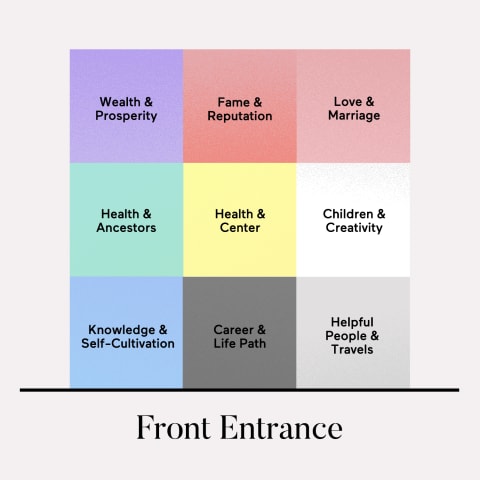Advertisement
Want To Use Feng Shui At Home? Start With These Top Do's & Don'ts

Curious about how to use feng shui to feel more relaxed, creative, and joyful at home? As an architect and feng shui educator, this is what I think about day in and day out. Here are my top dos and don'ts for using the ancient art of feng shui to optimize your home:
What is feng shui?
Feng shui teaches us how to achieve harmony with our environment.
Feng shui is all about designing the details of your environment to help you feel happier and better supported in your life. In practice, feng shui can look like painting your bedroom a soothing color to promote relaxation or clearing out dead houseplants to remove stagnant energy in your space. It's about creating an outward environment that reflects how you want to feel within.
The words "feng shui" are Chinese and translate to "wind" and "water." Wind is our breath, and humans are almost 60 percent water. Wind and water are vital elements for life, as is feng shui!
Historically, feng shui has roots in Taoism and Buddhism. However, elements of it are palpable in every culture across time. For instance, these days we can all feel the difference between a New York City apartment and a quiet, hidden cabin in the forest, and we understand that our surroundings greatly affect our energy.
How to feng shui your home
Place your bed, desk, and stove in a command position
One of the most effective and fundamental principles in feng shui is called the "commanding position," and it basically means that certain objects should be facing the entry door.
The most important objects to place in the command position are the bed, desk, and stove (read more about how to maximize the feng shui in your kitchen here).
The main door to the room or space is called the "mouth of chi," and it's thought to be the portal through which energy comes into your home and life. When you are cooking at the stove (or sleeping in bed, or sitting at a desk in your office), it’s best if you can see the door but not be directly in line with it. It's best to be diagonal from the door, while still facing it.
Understandably, this is not always possible, so you can make adjustments like placing a mirror such that you can see the door in the reflection while cooking at the stove (or sleeping in bed, or sitting at your desk). Here's a more in-depth primer on how to position your bed according to feng shui.
What is "chi"?
Pay special attention to your entryway
Your entry and front door represent the way you face the outside. It’s how the world sees you, like a first impression, so be sure to keep the area clean and clutter-free.
This does not mean the entry must be completely empty; rather it’s about keeping only what you need there. So if it’s winter, it makes sense to hang your scarf, hat, and coat.
The interior and exterior entry should also be well lit (get some bright bulbs on a dimmer!) and the door number should be clean, hung straight, and easily visible. Auspicious opportunities need clear signage to find you!
In addition, I often recommend putting down a nice black rectangular welcome mat to attract good energy. And while you're at it, check out these feng shui tips for your garden, too.
"Activate" your front door
The front door is literally and metaphorically where energy enters your home, and it can be an incredible auspicious area.
To activate its lucky energy, wait until an auspicious day like your birthday or a new moon. Between the hours of 11 a.m. and 1 p.m. (the most yang hours of the day), write a list of nine wishes for yourself using a newly purchased black pen on a sheet of red paper.
Read your list out loud, and then with respect, mindfully sign the list. Carefully fold the sheet and place it in a red envelope. Securely position your intentions and aspirations above the front door, on the inside of your home.
Now, every time you walk through your front door, you are invoking the energy of these wishes so they may manifest in your life. (Note: You can also use this for your bedroom door if you live with roommates!)
Pay special attention to your bed
We spend many hours sleeping in our beds, so the feng shui of our bedrooms is of the utmost importance.
First, I'd recommend putting your bed in the "commanding position" so it's facing the door to your room. You don't want the door to be behind where you sleep, as this is thought to create subconscious stress and uncertainty as you snooze. If possible, there should be at least 2 feet of walking space on the left and right side of the bed, with the headboard against the wall. Yes, you do need a headboard! A solid headboard without bars or holes, fastened securely to the bed, creates stability and harmony.
It’s also important to have space available on both sides of the bed. This means that you’ve made space for your partner (or future partner). Believe me: Nobody likes to sleep on the wall side! This also allows for a nightstand on each side of the bed. The nightstands do not have to match; however, it’s better if they are similar in size.
Finally, take some time to make your bed every morning and thank it for supporting you every night. It’s a beautiful way to start your day with a little bit of order and peace. That energy can resonate throughout the whole day until your bed welcomes you back to sleep at night.
Use a bagua map
The bagua map in feng shui divides our space into nine areas that each have its own focus. Ideally you can use this map to plan what furnishings you put where (for instance, you can position your office to be in the Wealth & Prosperity area).
Or if you rent, live in a small space, or just don't feel like moving furniture around, you can also work with your existing layout. Place a few family photos in the Love & Marriage area, for instance, or put some books in the Knowledge & Self-Cultivation area. These small touches can enhance the energy of that zone.
Choose your colors based on the 5 elements
The use of color in feng shui relates to the five elements of earth, metal, water, wood, and fire. The five elements are found in nature and are used to bring in energy to create balance. So if there’s an elemental energy that you require a bit more of, you can add that color to your space with paint, accessories, or even clothing.
- Earth element: If you're lacking self-care and stability, add more of the earth element. The colors for earth include earthy tones of yellow, orange, and brown. A dark-brown wood headboard can be used to ground your relationship.
- Metal element: The metal element (grays, whites, off-whites, and metallic tones) can provide more clarity and precision, and a silver metal frame for your vision board can help direct and expedite your goals.
- Water element: If you'd like to invite more flow or wisdom into your spaces, accents of black call upon the element of water. Try sitting in a black or dark blue chair when you study.
- Wood element: Wood energy can help to kick-start new beginnings and bring life energy into a space, and teal pillows on your sofa can bring life to the party when you entertain.
- Fire element: Finally, the red color of fire energy is magnetizing and can illuminate you when you need more passion or recognition. My favorite way to bring in fire energy is with fresh red flowers.
RELATED READ: How To Balance The 5 Elements At Home
Feng shui mistakes
Block doors
As previously mentioned, doors are super important in feng shui as they are portals for energy. Take a close look at each door in your home to see if there are any that cannot open a minimum of 90 degrees due to surrounding clutter or furniture.
When doors cannot open, it means that the positive energy coming into your life is being compressed and your full potential is not available to you. It also affects how you experience your life path (literally and metaphorically) and can leave you cramped and pinched rather than expansive and spacious.
Finally, doors also represent your voice in the world, so a blocked door can mean that your voice cannot fully be heard or communicated.
Leave out broken objects
Broken objects at home can become obstacles in your life and cause stress that holds you back. That broken doorbell that you keep meaning to repair may block you from receiving a visit from something or someone amazing. Dead or dying plants are also a no-no in feng shui.
Overstuff your closets
Many of us have those "I’ll fit into them someday" jeans from high school, but letting go of the clothing that we don’t need will give our brains a cue to also let go of other unnecessary things (like harmful people or unnecessary stress).
When we have a full closet, we give the universe the message that our lives are complete and we don’t need anything else. It’s astounding what clearing a little space in your closet can do to invite magic into your life.
Neglect any objects or areas
If there are areas or objects in your home that are collecting dust, it may symbolize areas of your life that are stagnant and ignored. If you don’t need that object, maybe it’s time to donate it. And if there’s a room you haven’t stepped foot in, maybe it’s time to peek inside.
It can be as simple as taking the time to move things around to stir up some good energy.
Let your windows get too dirty
In feng shui, windows represent the eyes of the inhabitants in the home. When we have dirty windows, we can’t see the world around us clearly and can get caught up in our perceptions. Take some time to clean windows regularly and then see how much light and joy come into your life.
Hang your artwork too low
Believe it or not, when someone has issues with sadness or low energy, I often notice that their artwork, photographs, and mirrors are hung low on their walls. The low artwork can bring down your chi. (Note: Even a bed that’s very low to the ground can bring down your mood).
It’s also good to fasten frames in two places so the art isn’t crooked.
Store things under your bed
I know many of us could use extra storage, but under the bed is not the place for it! In feng shui, it’s best to have the air flowing all around you while you’re sleeping, so it’s a big no-no to have objects under the bed—especially sharp, dangerous items.
Other items to watch out for are shoes, books, or anything associated with very active energy. If you have mementos from past relationships stored under there, it may mean that relationship is holding you back. If you must store something under the bed, make it something soft, like extra linens and pillows.
The takeaway
You might be surprised by how much these simple feng shui tweaks and tricks can help you achieve a more mindful home that allows you to slow down and notice the beauty of the present moment.
Watch Next
Enjoy some of our favorite clips from classes
Enjoy some of our favorite clips from classes
What Is Meditation?
Mindfulness/Spirituality | Light Watkins
Box Breathing
Mindfulness/Spirituality | Gwen Dittmar
What Breathwork Can Address
Mindfulness/Spirituality | Gwen Dittmar
The 8 Limbs of Yoga - What is Asana?
Yoga | Caley Alyssa
Two Standing Postures to Open Up Tight Hips
Yoga | Caley Alyssa
How Plants Can Optimize Athletic Performance
Nutrition | Rich Roll
What to Eat Before a Workout
Nutrition | Rich Roll
How Ayurveda Helps Us Navigate Modern Life
Nutrition | Sahara Rose
Messages About Love & Relationships
Love & Relationships | Esther Perel
Love Languages
Love & Relationships | Esther Perel


















